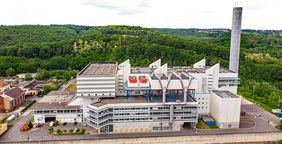
Climate-friendly heating for the Saar region
Saarbrücken. Saarbrücken-based STEAG New Energies GmbH and Fernwärme Verbund Saar GmbH (FVS), together with Entsorgungsverband Saar (EVS), will add a heat extraction system to the AVA Velsen waste-to-energy plant (AVA). In the future, around 170,000 megawatt hours (MWh) of heat will be fed into the Saar District Heating System annually via a six-kilometer-long connecting pipeline.
With this project, the partners are securing the climate-friendly district heating supply in the Saarland state in the long term. The necessity for that arises, among other factors, because of the Coal-fired Power Generation Termination Act (KVBG), which was passed only a few weeks ago. In the medium term, a replacement had to be found for the heat from the STEAG power plant in Völklingen-Fenne that will no longer be available in a few years’ time.
STEAG stands for security of supply
“We made efforts at a very early stage to find technical alternatives to secure the district heating supply,” says Thomas Billotet, Chairman of the Board of Management of STEAG New Energies, a subsidiary of the Essen-based energy company STEAG GmbH. In addition to the planned construction of two new heating plants, this is now being achieved through cooperation with EVS as the owner of AVA Velsen. “The tapping of the climate-friendly heat potential will also benefit the customers of the Saar District Heating System. Their heating supply will be even more resource-efficient in the future.” At the same time, with this project, STEAG is delivering on its the promise that has become the motto of all the Group’s entrepreneurial activities: “Securing energy supply. Now and in the future.“
EVS: From waste disposal company to resource manager
For EVS, the signing of the cooperation agreement marks the implementation of a lighthouse project that has been pursued for a long time, but for various reasons has not yet been put into practice. “As a public special purpose association, acting cost-consciously is in our very DNA, because we owe this to the fee payers,” says Georg Jungmann, Director of EVS. However, the use of the heat generated by the AVA Velsen waste-to-energy plant not only makes good economic sense, but also brings considerable advantages for the climate and environment. “This shows that the waste management industry can also make an important contribution when it comes to the transformation of our energy supply towards sustainability,” adds EVS Director Michael Philippi.
A valuable contribution to climate protection
Already today, 99 percent of the heating energy and hot water supplied by the Saar District Heating System (FVS) to its more than 13,500 customers along the 660-kilometer-long pipeline network comes from climate-friendly recovery of waste heat or from resource-saving combined heat and power generation (CHP).
“Until now, the CO2 emissions from district heating have been around 135 grams per kilowatt hour. This is already significantly less than a gas heating system, which emits just over 200 grams, or an oil heating system with over 260 grams per kilowatt hour,” explains Florian Eder, who is in charge of the project at STEAG New Energies. Thanks to the renewable share of the heat from AVA Velsen, this figure will improve further in the future, which will also be a considerable added value for heating customers.
The partners are now investing up to 20 million euros in the upgrading of the Velsen thermal waste recovery plant to a combined heat and power plant and the construction of a connection line to the existing FVS district heating system. The amount of possible public funding has not yet been determined. What is certain, however, is that the 170,000 MWh of heat supplied from thermal waste recovery per year will further improve the climate footprint of the district heating supply in the Saar.
Completion
Construction of the project is scheduled to start in the first quarter of 2021. Completion is expected to be achieved on time for the 2022/23 heating season.
